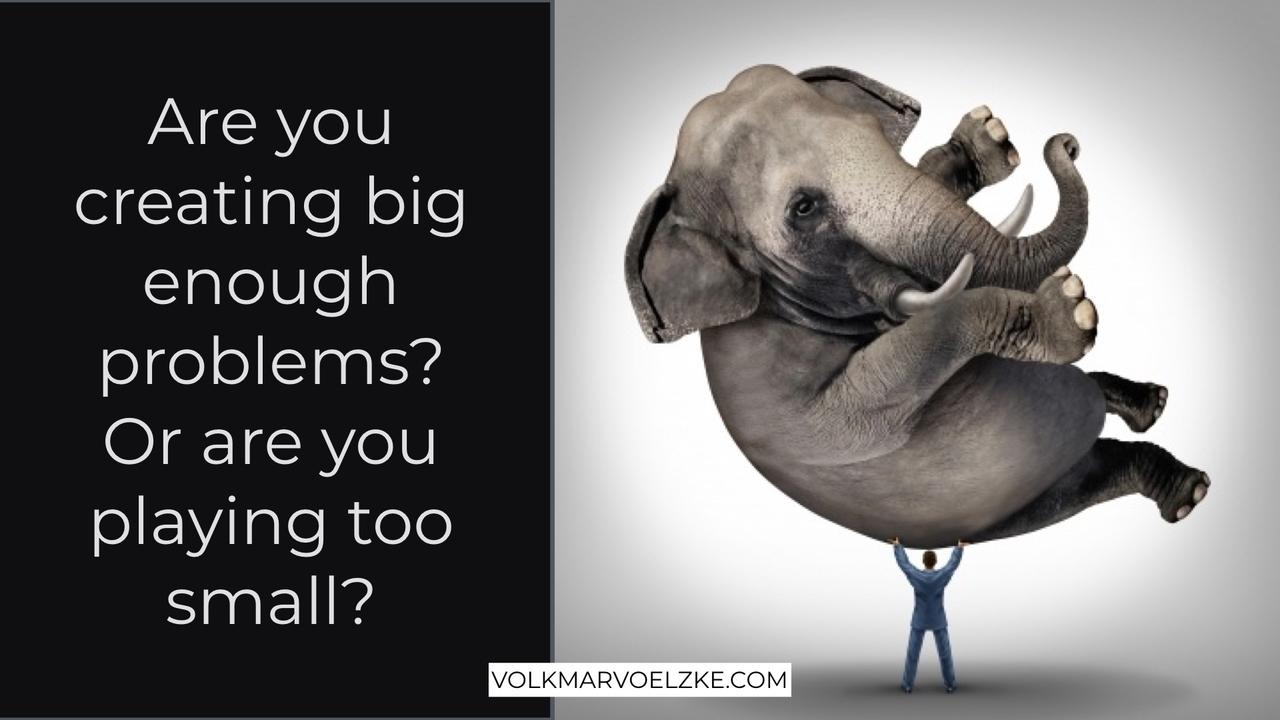Are you snapping back?
In my leadership development workshops, there is always a miraculous phenomenon: the workgroups develop innovative ideas - often outside the comfort zone - on how to lead people's ways of thinking and behaving towards more success.
This success takes place in "risk-free" exercises, where nothing direct happens to the ideas and results.
Almost everyone agrees that the ideas and measures presented make sense and have desirable positive effects, such as greater enthusiasm, increasing productivity, growing innovative power and so on.
But then something strange often happens: As soon as you give the same workgroups the task of creating concrete action packages for their divisions or departments from these ideas and measures, with milestones and success measures, they snap back into the old, conservative way of thinking. Examples:
- Instead of strong leadership with clear objectives, they prefer to discuss measures to change the structure.
- Instead of agreeing on a really strong vision w ...
Create more problems!

If you don't have enough success, maybe you are not creating enough problems! You might find yourself rubbing your eyes in amazement: "Create more problems? We already have enough of them!”
Or: "Don't the problems prevent us from focusing on the essentials?
This is all correct, however: Too often people do not strive for the next level of success because they fear they will get even more problems as a result.
And that is exactly the point: You will always generate problems if you substantially change something. So you better have the mindset that creating problems is something positive.
In other words, the more problems you create, the more it becomes a sign you, your team or company are developing substantially.
Or do you think that Elon Musk, Richard Branson, Steve Jobs, Nelson Mandela and many others have pursued the path to success without experiencing problems? It will more than likely be the opposite!
So, the next time you are looking for the easiest way with the lowest co...
Who wants to win anyway?

I have just come back from a global leadership workshop for a medium-sized company in Vienna. Almost 40 leaders who participated went through one and a half days of intensive and successful training. The goal was: to create the basis for winning team leadership.
In these types of workshops, the question inevitably arises as to why and whether we want to win. Is winning good at all? And, will others not lose if we win too much?
The answer to these questions is simple: once you have put the participants in a playful competitive situation, everyone will absolutely want to win - virtually without exception.
What really makes us have doubts about winning is the fear of too much success, because success obliges. Success means responsibility. Success raises the bar.
If you want a team or company that will continue to operate successfully in the future (instead of drowning), there is no alternative to winning. Here are the three most important levers you need to use:
- More ambition. Most ...
High performance and fun: a contradiction?

"A few years ago we had a burnout due to overwork in our staff," says the HR director at the meeting, where the aim is to increase the winning team spirit. Then he adds: "We must not demand too much from our people".
The others nod casually and the CEO remarks: "Yes, let's approach the whole thing with a sensitive touch." I know such objections quite well in a similar form. This reasoning is based on the belief that peak performance and fun are a contraction.
The problem: If you firmly believe that top performance stands in contrast to a pleasant working atmosphere and well-being, you will always shy away from establishing a winning team culture.
The consistently proven fact, on the other hand, is a different one: the happiest and most fulfilled people of all times challenge themselves again and again, measure themselves against the best, are more productive than the average person, and have an overall "winning mentality".
Any sustainable increase in performance begins with the rea...
The sin of omission

"I have to go to the next appointment now!" The words of the division head do not go unheard. The CFO immediately joins in: "I have important things to do" he says, adds "until next time" and leaves the room. The CEO quickly inserts "OK, thanks for the meeting, we'll see you again next week" before packing his things too.
What happened? Nothing unusual: Another meeting without clear results, without clear decisions, without clear actions. Instead, they had been discussing a single point for over 30 minutes in circles.
Why am I telling you this? Well, first of all, the situation described may seem familiar to you. Perhaps you also have meetings whose usefulness can be questioned. In addition, there is a significant problem for many companies: missed opportunities.
Every unsuccessful meeting is a sin of omission.
Why? Well, the time of the participants is the most valuable resource you have in the company. Whoever is in the meeting cannot do anything else during this time, i.e. canno...
The essence of good leadership

Why would anyone want to be led by you? I know that's a tough question, and it's not just about formal managers, it's about everyone:
It should be important to you that people want to follow you (and also horses and dogs, if that is your passion).
I used to do semi-professional ballroom dancing for a long time. There, the men have the leadership responsibility on the floor. I have never met a woman who liked weak, unclear leadership.
On the contrary, this is how we all feel: We are happier and achieve more if we lead ourselves and others well. What does that mean exactly?
Here are three important reminders that sometimes many people forget:
- Self-leadership. Leadership begins in yourself. You can never lead others better than you do for yourself. This includes clarity about your own goals, consistency, and recognition of achievements.
- Clarity. The number one criterion for good leadership is clarity: clarity about goals, clarity about the "why," clarity about first steps, clarity ...
What are you talking about?

When you’re studying the subject of success (which I have been doing for years), you will know that there are big differences in the topics that successful and average people discuss.
In other words, your choice of conversation topics determines how successful you are in life.
Usually, the most successful people speak about the decisions of today and the future. Conversely, the average person focuses on the present situation and the past, ("when it used to be better").
Successful people talk about visions and goals, mediocre people talk about other people and events.
Successful people see opportunities and control risks. The less successful people see the risks and avoid opportunities.
Of course, this view is not black and white, but I hope you can see the pattern.
Here are three things you should pay attention to yourself and your colleagues during your next conversation or meeting:
- Future. What opportunities and possibilities do you see, which you can seize from today's situ ...
Let’s make history!

You now have about 49 weeks left to write history this year. Seriously: what are you doing to move the world this year, at least in your surroundings and for your fellow human beings?
The direction of our lives is largely determined by the questions we ask ourselves.
And in my experience, most people do not ask themselves questions that will help them move forward, but questions that will leave them in the comfort zone.
"What am I going to do to write history this year?" is a strong, uncomfortable question. Because you may not have the answer. If your reaction is "What nonsense!", you are on the right track. That's because in this case you have the potential for more positive influence on your environment - and for making a real difference.
Here are three concrete ideas on how you can write history this year:
- Choose exactly one big goal! I know you've heard it a thousand times: what is your one big goal for the next 12 months? And yet, when I ask people in any environment (inclu ...
The need for fresh air

Let's be honest, right at the start of the new year: There are always 1000 reasons why one should not change anything - and certainly not yourself.
Those who care relatively little about these reasons are not only more successful on average but also happier, more fulfilled and more positive in the world.
You must have positive intentions, of course, but hopefully, that goes without saying.
Let me ask you a question about 2019: What would it be like if you question something that already exists every day and allow fresh and different ideas?
It's like opening your windows wide and letting fresh air flow through.
Where to start? From my work in 2018, I see the most " need for fresh air" in these areas:
- Leadership. Get out of your way of thinking through sparring partners and coaching. Cancel useless meetings and apply new findings from leadership research.
- Self-responsibility. In other words, we all have full responsibility to choose our attitude every minute. I find it downright ...
How to make 2019 a brilliant year
Welcome to the New Year! Here's a reminder of how a very simple method can make 2019 an outstanding year for you and the people around you. Watch the video and tell me what you think.
